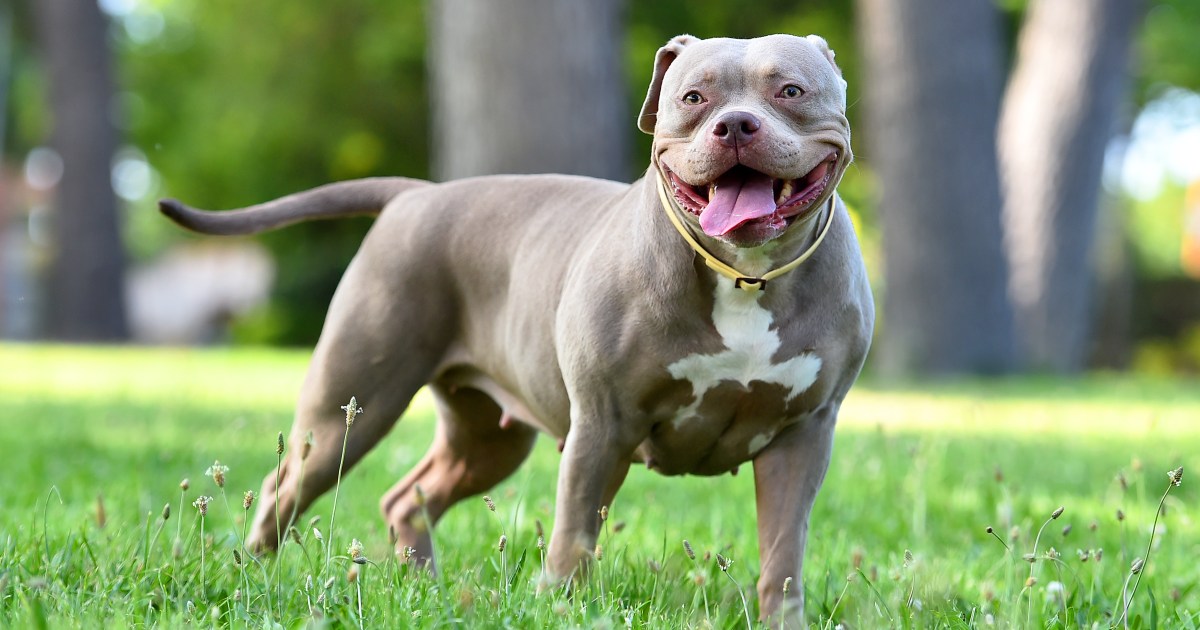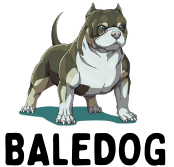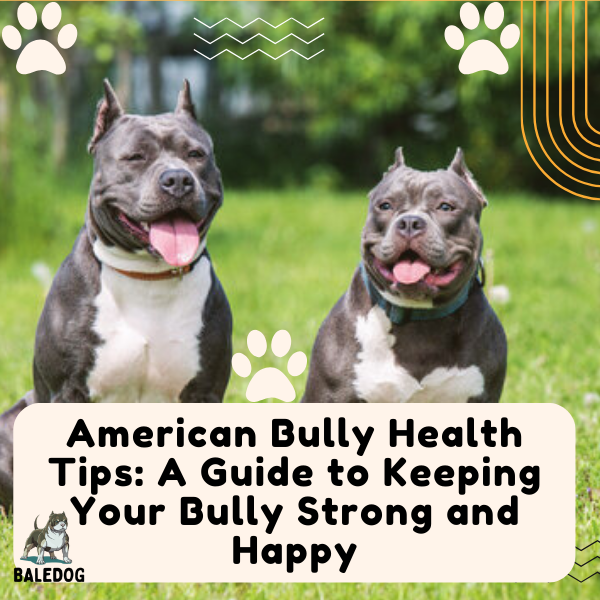American Bullies are beloved for their muscular build, loyalty, and affectionate nature. As one of the most popular dog breeds today, they are often seen as powerful, tough dogs. But like any breed, they require specific care to maintain their health and well-being. Whether you’re a new American Bully owner or you’ve had one for a while, it’s important to understand the breed’s unique health needs.

In this article, we’ll explore essential health tips for American Bullies, covering everything from nutrition and exercise to common health issues and preventive care. Let’s dive into the world of American Bully health and discover how to keep your dog at their best.
1. Proper Nutrition for a Healthy Bully
The foundation of a healthy American Bully is good nutrition. Because they are muscular dogs, they need a balanced diet that supports muscle growth, energy, and overall health.
A. High-Quality Dog Food
Look for premium dog food that contains high-quality protein (like chicken, beef, or lamb) as its first ingredient. American Bullies need higher protein levels compared to some other breeds, especially if they’re active. Carbohydrates like sweet potatoes or brown rice, along with healthy fats from sources like fish oil, can also help maintain their energy levels.
Make sure the food is designed for active dogs or specific for muscle-building to match their active lifestyle. This will help them build and maintain muscle mass without putting on excess fat.
B. Monitor Their Weight
American Bullies are prone to obesity, especially if they have a less active lifestyle. Regularly check your dog’s weight and body condition. If they start to look overweight, reduce calorie intake and increase exercise. Keep in mind, though, that you should always consult your vet before making any drastic changes to their diet.
C. Supplements
If your Bully is a senior or has joint issues, consider adding joint supplements (like glucosamine and chondroitin) to their diet. These can help support their joints and reduce the risk of conditions like hip dysplasia, which is common in larger breeds.
2. Exercise and Activity: Keeping Your Bully Fit
American Bullies are active and energetic dogs, requiring regular exercise to keep them fit and happy. But it’s not just about running around—it’s about giving them the right type of activity for their size and build.
A. Daily Walks and Playtime
Make sure to give your Bully daily walks, at least 30-60 minutes, depending on their energy level. Bullies love to be active and explore, so a brisk walk or jog in the park is an excellent way for them to get both physical and mental stimulation.
In addition to walks, playtime is essential. Games like fetch, tug-of-war, or hide-and-seek can help strengthen your dog’s muscles and keep their mind sharp. These activities also promote bonding between you and your dog.
B. Avoid Overexertion
Because American Bullies have a stocky build and muscular bodies, overexertion can lead to joint stress or muscle strain. While they’re energetic, it’s important to know your dog’s limits. On hot days, avoid strenuous activities in the midday sun to prevent overheating.
As your dog ages or if they’re recovering from an injury, you may need to adjust their exercise routine to accommodate their physical condition.
C. Mental Stimulation
While physical exercise is key, American Bullies also need mental stimulation to stay happy. These dogs are intelligent and highly trainable, so keep them engaged with puzzle toys, training sessions, and new challenges. This helps reduce boredom, which can lead to destructive behavior.
3. Regular Vet Check-Ups and Preventive Care
Keeping up with regular vet check-ups is essential for your American Bully’s long-term health. Early detection of health issues can prevent them from becoming serious or even life-threatening.
A. Regular Vaccinations and Parasite Control
Your American Bully should be vaccinated according to your vet’s recommendations. Vaccinations protect against dangerous diseases like distemper, parvovirus, and rabies, which can be fatal.
Don’t forget about parasite prevention—fleas, ticks, and worms are common problems. Your vet will recommend a monthly preventive treatment plan to protect your dog from parasites.
B. Dental Health
American Bullies are prone to dental issues, including tartar buildup, gum disease, and bad breath. Brush your Bully’s teeth regularly with a dog-safe toothbrush and toothpaste, or use dental chews to help maintain their oral hygiene.
C. Routine Health Screenings
Annual check-ups are crucial, especially as your American Bully gets older. Your vet will check for common breed-specific conditions, including:
- Hip and elbow dysplasia: Both are common in the breed due to their muscular build.
- Heart issues: American Bullies can develop heart disease, especially as they age.
- Eye conditions: Keep an eye on their vision as they age, as some Bullies are prone to cataracts.
4. Common Health Issues in American Bullies
Like all breeds, American Bullies have a few health concerns that are more common in their breed. Understanding these potential issues can help you spot early symptoms and take preventive action.
A. Hip Dysplasia
Hip dysplasia is a genetic condition where the hip joint doesn’t develop properly, causing pain, stiffness, and eventually arthritis. It’s common in larger breeds like the American Bully. Regular exercise, weight management, and joint supplements can help manage the condition. In severe cases, surgery may be necessary.
B. Skin Allergies and Dermatitis
American Bullies have short coats, but their skin can be sensitive to allergens, such as pollen, dust mites, or certain foods. Allergies can cause symptoms like itching, redness, hair loss, and rashes. Regular baths with hypoallergenic shampoo and a healthy diet can help reduce these issues.
If you notice chronic itching or rashes, consult your vet to pinpoint the cause of the allergies and discuss treatment options, such as antihistamines or special medicated shampoos.
C. Heart Issues
Some American Bullies, especially those with certain genetic lines, can develop heart problems, such as heart disease or valve issues. Symptoms might include coughing, difficulty breathing, or lethargy. Regular vet check-ups can help monitor heart health and catch any potential issues early.
D. Breathing Problems
Due to their short snouts (brachycephalic features), some American Bullies may experience breathing difficulties, especially in hot weather or after strenuous activity. Be mindful of this during exercise and avoid overheating. If your dog starts wheezing or has trouble breathing, it’s important to get them checked by a vet.
5. Grooming and Skin Care
Even though American Bullies have a short coat, grooming is still important to maintain their overall health.
A. Regular Brushing
While they don’t shed as much as long-haired breeds, American Bullies still benefit from regular brushing. A quick brush once or twice a week will help keep their coat shiny and reduce shedding. It also helps to remove dirt and dead skin cells, promoting healthy skin.
B. Bathing
American Bullies should be bathed every 4-6 weeks, or sooner if they get particularly dirty or smelly. Use a gentle, hypoallergenic dog shampoo to prevent skin irritation. Be sure to dry them thoroughly afterward, especially around the folds of their skin, to prevent any moisture buildup that could cause irritation or infections.
C. Nail Care
Regular nail trims are important to prevent overgrowth, which can cause discomfort or lead to injury. Trim your dog’s nails at least once a month, and be careful not to cut too close to the quick.
6. Managing Weight and Preventing Obesity
American Bullies love to eat, and because they have such strong muscles, they can quickly gain weight if their diet isn’t managed. Obesity can lead to joint issues, heart problems, and even diabetes.
A. Control Portions
Measure out your Bully’s meals to ensure they’re getting the right amount of food. Avoid free-feeding or giving too many treats. Most importantly, choose food that’s rich in protein and fiber and low in fat.
B. Be Active
As mentioned earlier, regular exercise is key to preventing obesity. Make sure your American Bully gets enough activity to burn off energy and keep their metabolism in check.
7. Conclusion: Keeping Your American Bully Healthy and Happy
American Bullies are incredible companions, and their health is crucial to their happiness and longevity. By following these health tips—providing proper nutrition, regular exercise, routine vet visits, and a good grooming regimen—you can ensure your Bully lives a long, active, and fulfilling life.
Remember, each dog is unique, and your American Bully’s needs may vary. Regular communication with your vet will ensure you’re on the right track to keeping your dog in the best health possible. By being proactive about their care, you’ll give your Bully the best chance at a happy, healthy life full of love, play, and loyalty.
8. Building a Strong Bond Through Care
One of the most important aspects of owning an American Bully is the strong bond you build with your dog. A healthy dog is not only physically fit, but also mentally and emotionally well-balanced. Taking the time to understand their needs, providing consistent training, and offering affection helps strengthen that bond and improves their overall health.
A. Socialization and Mental Health
American Bullies are social dogs that thrive on companionship and human interaction. Proper socialization is essential to ensure that your Bully is well-adjusted and comfortable around people, other animals, and new environments. Exposing your puppy to different experiences, sounds, and people from a young age will make them more confident and less likely to develop behavioral issues.
For adult Bullies, maintaining positive social interactions with other dogs and people is crucial to their mental health. Negative experiences, like isolation or lack of proper socialization, can lead to anxiety or aggression. Organizing playdates with other friendly dogs, or simply taking your Bully to dog-friendly parks, can help them stay well-socialized.
B. Consistent Training
American Bullies are intelligent and eager to please, but they can sometimes be stubborn. Consistent training and positive reinforcement are the keys to a well-behaved dog. Use treats, praise, and patience to reinforce good behavior. Training doesn’t just help with obedience—it also provides mental stimulation, which is crucial to preventing boredom and unwanted behaviors.
Some basic training commands to focus on include:
- Sit and stay
- Come and heel
- Leave it (important for preventing your Bully from chewing on things they shouldn’t)
Incorporate training into daily life to make it a fun and bonding experience for both you and your dog.
9. Environmental Factors to Consider for Your American Bully
American Bullies are relatively adaptable, but their health and well-being can be influenced by environmental factors. Here are a few things to consider to ensure your home and outdoor space are safe and comfortable for your dog.
A. Temperature Sensitivity
As mentioned earlier, American Bullies have a short coat and are sensitive to temperature extremes. They can easily overheat in hot weather, and cold temperatures can make them uncomfortable or even ill. In summer, make sure they have access to cool, shaded areas and fresh water at all times. In winter, provide a warm, cozy place for them to rest, away from drafts. If you live in a particularly hot or cold region, consider adjusting your walks and outdoor playtime to the cooler parts of the day.
B. Safe, Dog-Friendly Home Environment
Your home should be safe for an energetic dog. American Bullies, especially puppies, can be curious and prone to getting into things they shouldn’t. Pet-proofing your home is essential to prevent accidents. Remove dangerous household chemicals, electrical cords, and small objects that can be swallowed.
When outdoors, ensure your yard is fully fenced with no escape routes. Bullies are strong dogs, and they can be surprisingly determined when it comes to finding ways out of the yard. A secure fence is a must to keep them safe from traffic or other hazards.
10. Senior American Bully Health Tips
As your American Bully ages, their health needs may change. Senior Bullies are still strong and loyal, but they may require extra care to stay comfortable and healthy.
A. Adjust Exercise Routine
Older Bullies might not have the same energy levels as when they were younger. While they still need exercise, moderate activity is key to avoid overstrain on their joints. Shorter, more frequent walks can be a great way to keep them moving without putting too much stress on their bodies.
B. Joint Care and Supplements
As mentioned earlier, American Bullies are prone to hip and elbow dysplasia, especially as they age. Joint supplements with glucosamine, chondroitin, and omega-3 fatty acids can help maintain joint health and reduce stiffness and discomfort. Your vet may also recommend physical therapy or acupuncture for older dogs dealing with joint issues.
C. Regular Vet Check-Ups
As dogs get older, they are more prone to developing certain health conditions, such as arthritis, heart disease, and kidney problems. Regular vet visits become even more important as your Bully enters their senior years. Annual or semi-annual check-ups will allow your vet to catch potential issues early and make adjustments to their treatment plan as necessary.
11. The Importance of Hydration
American Bullies, like all dogs, need constant access to fresh water. Dehydration can lead to serious health problems, including kidney issues and reduced energy levels. Always ensure that your dog has access to clean water, especially after exercise or during warmer weather.
In addition to keeping water available, keep an eye on your dog’s hydration levels. If your Bully is drinking excessively or not drinking enough, this could be a sign of a health issue and should be checked by a vet.
12. Conclusion: The Path to a Happy, Healthy American Bully
Caring for an American Bully requires understanding their unique health needs and providing them with the best care possible. From a balanced diet and regular exercise to early vet check-ups and mental stimulation, every aspect of your Bully’s life contributes to their overall health and happiness.
By staying proactive and paying attention to potential health concerns, you can ensure that your American Bully leads a long, vibrant, and joyful life. Their loyalty, energy, and affectionate nature make them excellent companions, and with the right care, your Bully will continue to be a loving part of your family for many years to come.
Remember, each dog is an individual, so it’s important to adapt these tips to suit your dog’s specific needs. By listening to your Bully and making their well-being a top priority, you’ll be able to enjoy a healthy, happy, and strong bond with your four-legged friend.


